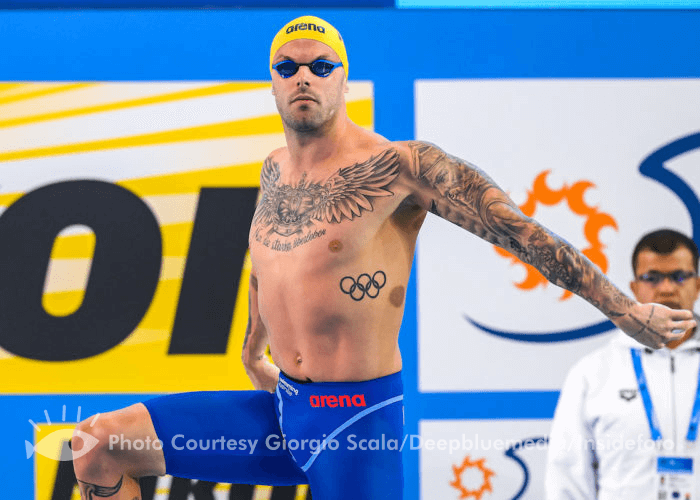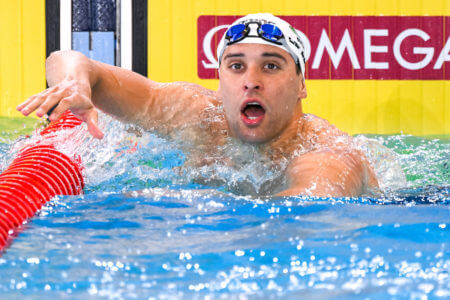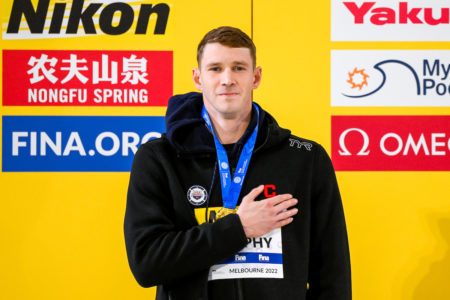Top 5 Male Performances of Short Course Worlds: Chalmers Plays Relay Hero for Australia

A Special Thanks to Deep Blue Media for providing the images from this meet Top Five Male Performances of Short Course Worlds: Chalmers Plays Relay Hero for Australia It’s hard to believe, but the gold medal Kyle Chalmers won in the men’s 100 freestyle at the Short Course World Championships last week was his first individual gold at a global-level meet in more than six years. His only previous honor came at the 2016 Olympics, when the then-18-year-old stormed back from seventh place at the halfway point to secure the title in upset fashion. Since then, Chalmers has won gold medals at the Pan Pacific Championships and Commonwealth Games but only silver medals at the World Championships (in 2019) and Olympics (in 2021), both in agonizing fashion. But even during that long run of coming up just short in individual races, Chalmers has become the most feared relay swimmer in the world. When he enters the water for Australia, often on the anchor leg, a rival can only hope to have built enough of a lead to hold off his surge. Twice at the World Championships, those leads were not safe as the hard-charging Chalmers came through for Aussie gold. Maggie Mac Neil posted the top female performance of Short Course Worlds with her world record in the 100 butterfly, and the top men’s performance goes to Chalmers for a pair of relay anchor splits. Here are the top five: With 50 meters to go in the 200 free relay, the Australians sat in fifth place, six tenths off Italy’s lead with Japan, the United States and the Netherlands also ahead. That did not matter for Chalmers. Fresh off his 100 free gold medal earlier that night, he blasted a 20.34 split to put the Aussies on top. He got to the wall in 1:23.44, four hundredths ahead of Italy’s Manuel Frigo. Four days later, in the final race of the meet, Chalmers entered the water to anchor Australia’s 400 medley relay more than a second below American Kieran Smith and almost a second behind Italy’s Alessandro Miressi. Somehow, he did it again, his 44.63 split ranking as the quickest in history as he pulled Australia into a tie with the U.S. men at the finish, with both teams swimming a new world record. Chalmers ended up with six total relay medals in Melbourne, including in the 800 free relay where his 1:40.35 split was tops in the field as he helped Australia swim quicker than the existing world record in a runnerup finish behind the United States. While significant goals remain for Chalmers’ swimming career, he was quick to say of his first relay gold of the meet, “It ranks up there massively in my career highlights.” Given his international success over the past seven years, that’s no small feat. Chad le Clos — Photo Courtesy: Giorgio Scala / Deepbluemedia / Insidefoto The prospects of 30-year-old South African Chad le Clos hitting vintage form at this year’s Short Course Worlds were not great, not after a year where le Clos pulled out of the World Championships because of breathing trouble and then was disappointed with his performances at the Commonwealth Games, where he narrowly missed out on 200 fly gold and missed the podium altogether in the 100 fly. Le Clos called the latter race “a low point in my career.” After that meet, le Clos relocated to Germany to begin training under Dirk Lange — and that partnership has worked out perfectly so far. At this later stage of his career, more than a decade past his stunning defeat of Michael Phelps in the 200 fly at the 2012 Olympics, le Clos is still elite in short course. In fact, he swam faster than ever before in winning gold in the 200 fly in Melbourne. Le Clos is known for going out fast and trying to hold on, but this time, he instead lurked throughout the final, letting Trenton Julian and Daiya Seto set the pace. He was seven tenths behind with 50 meters to go, but then he reached for another gear and hit stride. That helped le Clos finish in 1:48.27, ahead of his 2018 personal best of 1:48.32 and just three hundredths off Seto’s World Championships record of 1:48.24 (the mark which had been the world record prior to Tomoru Honda blowing past 1:47 into the 1:46-range in October). The win was his fourth Short Course Worlds gold in the event (he previously won in 2010, 2014 and 2016), and le Clos was emotional in the aftermath, calling the win “a dream come true.” On the final day of the meet, le Clos won gold in the 100 fly as well, clinching the fifth title of his career in that event. His mark of 48.59 was not a best time, but only le Clos and three others have ever been quicker. The defending short course world champion in the 200 free, Hwang barely qualified for the final this time, his time of 1:42.44 leaving just a tenth ahead of the ninth-place finisher. To make matters worse, Hwang broke his finger on the finish, and he briefly questioned whether or not he could even race in the final. But the 19-year-old from South Korea quickly shook off the morning result and put together a complete race at night to win gold once again. Hwang narrowly trailed Olympic champion Tom Dean at the halfway point, but he took off on the third 50, building a lead of eight tenths with two lengths remaining, and he ended up winning by more than a second in 1:39.72, good enough to become the third man in history under 1:40 — and the first in 10 years. Hwang gets overshadowed a bit by David Popvoci, a fellow teenager who has become the world’s best long course swimmer in the 100 free and 200 free, but in short course, he finished well ahead of Popovici while making a statement about his own potential in the 200-meter race in the Olympic distance. Ryan Murphy — Photo Courtesy: Giorgio Scala / Deepbluemedia / Insidefoto This edition of Short Course Worlds brought a signature performance for a swimmer who was already one of the most decorated in the world over the course of his decade-long international career. Murphy swept gold medals in the 50, 100 and 200 back in Melbourne, and he also played key roles in U.S. gold medals in the mixed 200 medley relay and men’s 400 medley relay plus a silver in the men’s 200 medley relay. His 50 back win came after a bit of controversy after a starting system malfunction forced the a re-swim of the entire race, denying Australian teenager Isaac Cooper a gold medal he thought he had secured, and on the meet’s final day, Murphy pulled away from teammate Shaine Casas in the 200 back. But Murphy’s top performance in Melbourne came in the 100 back, where he crushed the field from the beginning and finished in 48.50, the second-fastest time in history and just off Coleman Stewart’s world record (48.33). That performance came on the heels of a long layoff from training after the long course edition of the World Championships and with most of his top rivals present at the meet (although Thomas Ceccon did skip the 100 back), and for Murphy’s efforts, he was named the top male swimmer of the meet. Seto’s top swim of the meet was probably in the 200 breaststroke, where he came up just two tenths short of a world record despite never previously winning an international medal in the stroke. But it’s impossible to ignore his accomplishment in the 400 IM, where he pulled away to win a sixth-consecutive short course world title in the event. Yes, six gold medals, a streak stretching back a decade to the 2012 Short Course World Championships in Istanbul. This time, Seto fended off emerging medley star Carson Foster, who won silver in the 400 IM at the long course edition of the World Championships earlier this year. Trailing slightly after the backstroke leg, Seto then opened up a lead of almost 2.5 seconds on breaststroke, and there was no way Foster could catch up. The 28-year-old from Japan finished in 3:55.75, less than a second off his own world record and a time that only he and Ryan Lochte had ever beaten. Even with some top competitors missing from Short Course Worlds over the years (including the likes of Leon Marchand this year), Seto gets enormous props for somehow remaining unbeaten going all the way back to his teenage years.

1. Kyle Chalmers, 200 Freestyle Relay Anchor Leg (20.34) and 400 Medley Relay Anchor Leg (44.63)
2. Chad le Clos, 200 Butterfly (1:48.27)

3. Hwang Sunwoo, 200 Freestyle (1:39.72)
4. Ryan Murphy, 100 Backstroke (48.50)

5. Daiya Seto, 400 IM (3:55.75)




